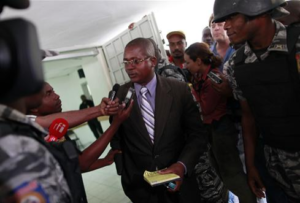
Patricia Louis, a third-year law school student in Port-au-Prince, said corruption is so commonplace in Haitian courts that it’s nearly assumed when it’s a high-profile case or one where the defendant has money.
“The judicial system is like going to a street market — you have to bargain for your sentence,” said Louis, 26. “It’s really difficult to find who’s really innocent and who’s guilty.”
A Dominican Republic lawyer has said that the Haitian lawyer he hired to defend 10 Baptists from the United States who are charged with child kidnapping had tried to bribe the missionaries’ way out of jail and has been fired.
Jorge Puello, the lawyer in the neighboring Dominican Republic retained by relatives of the missionaries after their arrest last week, told the Associated Press that he fired Edwin Coq.
Coq orchestrated “some kind of extortion with government officials” that would have led to the release of nine of the 10 missionaries, Puello charged.
“He had some people inside the court that asked him for money, and he was part of this scheme.”
Coq said the money was for himself. “I have worked for 10 people for four days working all hours,” he said.
Haitians said the Americans may have trouble learning to navigate what can be a complicated system. But when money is involved, the process can be simple, they say.
In a civil case where two Haitians are in a dispute, Ricardy Gelin said the evidence has little to do with the outcome.
“It’s the person who gives the most money (to the judge) who wins,” said Gelin, 29, an advertiser. “People joke about it.”
A similar standard applies to criminal cases, Gelin said.
If a case does make it to trial, Mario Acacia said bribery can affect the outcome. Acacia, who has been a lawyer for a decade in Port-au-Prince, said judges no longer rely on witness testimony. Since serious cases regularly take two years to go to trial, Acacia said “that gives time to bribe the witnesses.”
“It’s a mess,” he said.
The widespread corruption is due, in part, to the incredibly low wages paid to judges, said Jean Claude, a police officer. He said entry-level lawyers are paid less than the equivalent of $500 U.S. dollars a month.
Those judges, called justices of the peace, often respond directly to the scene of small crimes instead of police. They gather evidence and interview witnesses. Yet there is no government stipend for transportation costs, and Claude said that salary makes it extremely difficult to even own a car.
Puello said Coq initially requested $10,000 but kept asking for more. He said Coq eventually asked for $60,000, saying he could guarantee it would lead to the Americans’ release.
A magistrate charged the group’s members Thursday with child kidnapping for trying to take 33 children out of Haiti without proper documents.
The Americans said they were a humanitarian mission to rescue orphans. The families of the children told the AP they gave the kids to the group because the missionaries promised to educate them at an orphanage in the Dominican Republic and said they would allow parents to visit.
Acacia said that the government has made strides to eliminate fraud from the system. Many judges have been investigated and removed from office, and Acacia said that corruption, while still ongoing, is nowhere near where it used to be.
“It doesn’t happen often, but it happens,” Acacia said.
Contributing: The Associated Press